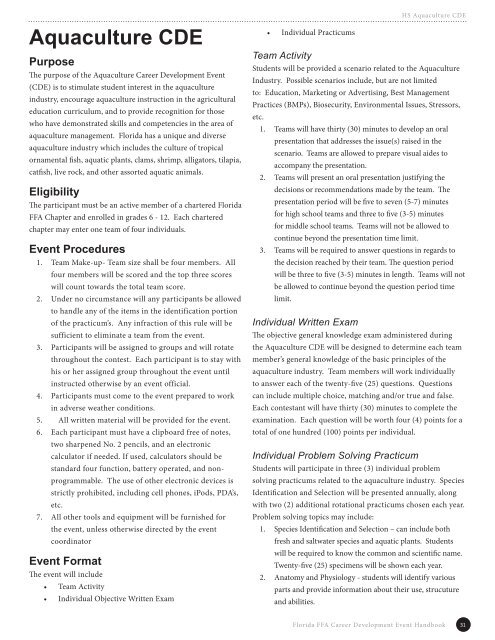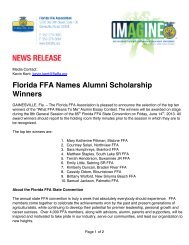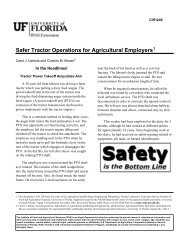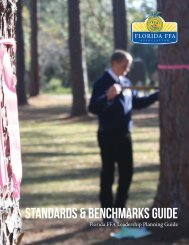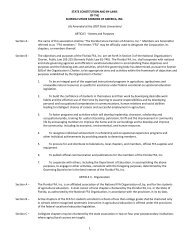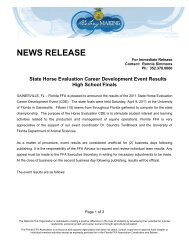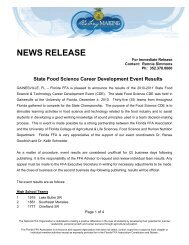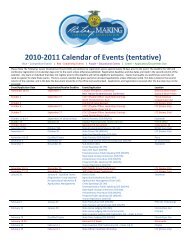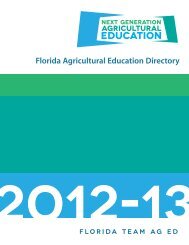CDE Handbook - Florida FFA Association
CDE Handbook - Florida FFA Association
CDE Handbook - Florida FFA Association
Create successful ePaper yourself
Turn your PDF publications into a flip-book with our unique Google optimized e-Paper software.
Aquaculture <strong>CDE</strong><br />
Purpose<br />
The purpose of the Aquaculture Career Development Event<br />
(<strong>CDE</strong>) is to stimulate student interest in the aquaculture<br />
industry, encourage aquaculture instruction in the agricultural<br />
education curriculum, and to provide recognition for those<br />
who have demonstrated skills and competencies in the area of<br />
aquaculture management. <strong>Florida</strong> has a unique and diverse<br />
aquaculture industry which includes the culture of tropical<br />
ornamental fish, aquatic plants, clams, shrimp, alligators, tilapia,<br />
catfish, live rock, and other assorted aquatic animals.<br />
Eligibility<br />
The participant must be an active member of a chartered <strong>Florida</strong><br />
<strong>FFA</strong> Chapter and enrolled in grades 6 - 12. Each chartered<br />
chapter may enter one team of four individuals.<br />
Event Procedures<br />
1. Team Make-up- Team size shall be four members. All<br />
four members will be scored and the top three scores<br />
will count towards the total team score.<br />
2. Under no circumstance will any participants be allowed<br />
to handle any of the items in the identification portion<br />
of the practicum’s. Any infraction of this rule will be<br />
sufficient to eliminate a team from the event.<br />
3. Participants will be assigned to groups and will rotate<br />
throughout the contest. Each participant is to stay with<br />
his or her assigned group throughout the event until<br />
instructed otherwise by an event official.<br />
4. Participants must come to the event prepared to work<br />
in adverse weather conditions.<br />
5. All written material will be provided for the event.<br />
6. Each participant must have a clipboard free of notes,<br />
two sharpened No. 2 pencils, and an electronic<br />
calculator if needed. If used, calculators should be<br />
standard four function, battery operated, and nonprogrammable.<br />
The use of other electronic devices is<br />
strictly prohibited, including cell phones, iPods, PDA’s,<br />
etc.<br />
7. All other tools and equipment will be furnished for<br />
the event, unless otherwise directed by the event<br />
coordinator<br />
Event Format<br />
The event will include<br />
• Team Activity<br />
• Individual Objective Written Exam<br />
• Individual Practicums<br />
HS Aquaculture <strong>CDE</strong><br />
Team Activity<br />
Students will be provided a scenario related to the Aquaculture<br />
Industry. Possible scenarios include, but are not limited<br />
to: Education, Marketing or Advertising, Best Management<br />
Practices (BMPs), Biosecurity, Environmental Issues, Stressors,<br />
etc.<br />
1. Teams will have thirty (30) minutes to develop an oral<br />
presentation that addresses the issue(s) raised in the<br />
scenario. Teams are allowed to prepare visual aides to<br />
accompany the presentation.<br />
2. Teams will present an oral presentation justifying the<br />
decisions or recommendations made by the team. The<br />
presentation period will be five to seven (5-7) minutes<br />
for high school teams and three to five (3-5) minutes<br />
for middle school teams. Teams will not be allowed to<br />
continue beyond the presentation time limit.<br />
3. Teams will be required to answer questions in regards to<br />
the decision reached by their team. The question period<br />
will be three to five (3-5) minutes in length. Teams will not<br />
be allowed to continue beyond the question period time<br />
limit.<br />
Individual Written Exam<br />
The objective general knowledge exam administered during<br />
the Aquaculture <strong>CDE</strong> will be designed to determine each team<br />
member’s general knowledge of the basic principles of the<br />
aquaculture industry. Team members will work individually<br />
to answer each of the twenty-five (25) questions. Questions<br />
can include multiple choice, matching and/or true and false.<br />
Each contestant will have thirty (30) minutes to complete the<br />
examination. Each question will be worth four (4) points for a<br />
total of one hundred (100) points per individual.<br />
Individual Problem Solving Practicum<br />
Students will participate in three (3) individual problem<br />
solving practicums related to the aquaculture industry. Species<br />
Identification and Selection will be presented annually, along<br />
with two (2) additional rotational practicums chosen each year.<br />
Problem solving topics may include:<br />
1. Species Identification and Selection – can include both<br />
fresh and saltwater species and aquatic plants. Students<br />
will be required to know the common and scientific name.<br />
Twenty-five (25) specimens will be shown each year.<br />
2. Anatomy and Physiology - students will identify various<br />
parts and provide information about their use, strucuture<br />
and abilities.<br />
<strong>Florida</strong> <strong>FFA</strong> Career Development Event <strong>Handbook</strong> 31


